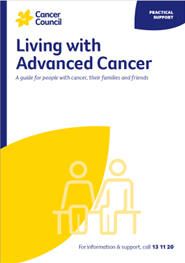- Home
- About Cancer
- Advanced cancer
- Living with advanced cancer
- Treatment for advanced cancer
- When treatment seems too much
When treatment seems too much
It can feel worth it to deal with side effects for a primary cancer. But when a cure is unlikely, you may not want treatments that leave you exhausted or sick, even if they may help you to live longer.
- Before you start or stop treatment, think about the benefits, risks and burdens. Decisions rarely have to be made immediately.
- Ask yourself if you are feeling unwell from the side effects of the treatment, from the advancing disease or from the emotions of the diagnosis. Some or all of these may be able to be treated, and you may have a different outlook if you feel better.
- Check with your health care team whether your treatment can be adjusted to limit side effects.
- Speak to professionals, such as your doctor, a counsellor or social worker, who can help you decide what is important to you.
Refusal of medical treatment
If you are well enough to make clear decisions (called having capacity), you have the right to refuse any treatment offered, even if it goes against your doctor’s recommendation. Your medical team will usually still explain the proposed treatment and what will happen if you don’t have it. You can stop each treatment separately and at any time – you do not have to accept treatment on an all-or-nothing basis.
In all states and territories, you can complete an Advance Care Directive that your health care team (nurses, doctors, paramedics, etc) must follow. This is a legal document in which you can give instructions about future medical treatment, including any treatment that you do not want to have. It will apply if you get too unwell (lose capacity) to make decisions.
If you have capacity, you can also appoint a substitute decision-maker to make treatment decisions if you become unable to.
→ READ MORE: Chemotherapy for advanced cancer
Podcast: Treatment Options for Advanced Cancer
Listen to more of our podcast for people affected by advanced cancer
More resources
Dr Lucy Gately, Medical Oncologist, Alfred Health and Walter and Eliza Institute for Medical Research, VIC; Dr Katherine Allsopp, Supportive and Palliative Care Specialist, Westmead Hospital, NSW; A/Prof Megan Best, The University of Notre Dame Australia and The University of Sydney, NSW; Dr Keiron Bradley, Palliative Care Consultant, Medical Director Palliative Care Program, Bethesda Health Care, WA; Craig Brewer, Consumer; Emeritus Professor Phyllis Butow, Psychologist, The University of Sydney and Chris O’Brien Lifehouse, NSW; Louise Durham, Palliative Care Nurse Practitioner Outpatients, Princess Alexandra Hospital, Metro South Palliative Care, QLD; Dr Roya Merie, Radiation Oncologist, ICON Cancer Centre, Concord, NSW; Penny Neller, Project Coordinator, National Palliative Care Projects, Australian Centre for Health Law Research, Queensland University of Technology, QLD; Caitriona Nienaber, 13 11 20 Consultant, Cancer Council WA; Xanthe Sansome, Program Director, Advance Care Planning Australia, VIC; Sparke Helmore Lawyers; Peter Spolc, Consumer.
View the Cancer Council NSW editorial policy.
View all publications or call 13 11 20 for free printed copies.
Need to talk?
Support services
Coping with cancer?
Speak to a health professional or to someone who has been there, or find a support group or forum
Need legal and financial assistance?
Pro bono services, financial and legal assistance, and no interest loans
Cancer information
Dealing with the diagnosis
Common reactions to a cancer diagnosis and how to find hope
Explore our resource hub
Explore and download our booklets, fact sheets, podcasts, webinars and videos for people affected by cancer

